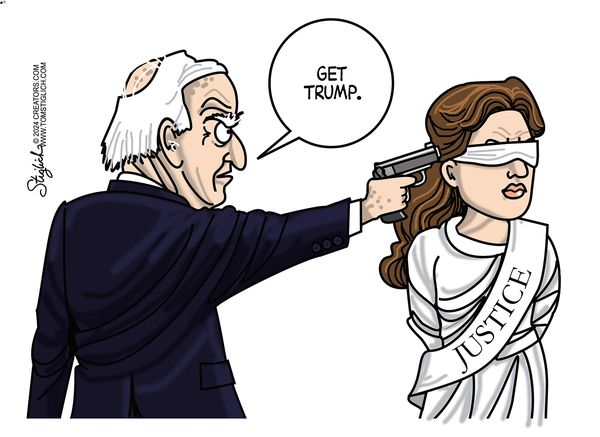Is The Hush Money Case Already Crumbling? Bragg Could Not Name the “Illegality” of Trump’s Actions

If non-disclosure agreements were illegal, nearly every corporation in America would be sued into oblivion. And it’s just such an NDA that Stormy Daniels signed, happily and voluntarily pocketing $130,000 to do so.
According to Greg Germain, a law professor at Syracuse University, Manhattan District Attorney Alvin Bragg has failed to highlight what specific law was broken when the Trump team offered the porn star money in exchange for signing an NDA. Instead, Bragg floundered on the rocks as he attempted to frame Trump’s actions as an “illegal” attempt to influence the 2016 election.
But don’t all candidates try to “influence elections” to secure their victory? After all, the desire to influence the 2020 election drove President Joe Biden’s campaign team to cover incriminating evidence regarding the Hunter Biden laptop. In 2016, then-candidate Hillary Clinton spent millions of dollars inventing a report slathered in falsehoods to influence an election.
Germain notes that Bragg has repeatedly said that the NDA payments were illegal but has yet to point out exactly what law was broken.
Germain observes that while it’s apparent that Trump did arrange for the payments, NDA payments are legal. Bragg is hanging his entire prosecution on a New York election law that states it is illegal for people to conspire in an election through “unlawful means.”
In the trial, prosecutors aim to persuade the jury that Trump sought to sway the election by covering up “criminal actions” when he reimbursed Cohen in 2017.
But Bragg’s argument has a problem – on the surface, no one broke any laws with the NDA itself. The only charge that may prevail is one in which Trump’s payments to his lawyer were classified as “legal fees.” Even that may be a tenuous argument. After all, Michael Cohen, who facilitated the payments, was a lawyer.
Falsifying business records is considered a misdemeanor under New York law. However, it can be classified as a felony if it’s done to conceal another crime, as Manhattan District Attorney Alvin Bragg claims in Trump’s situation.
Germain notes that hiding information from voters may be sleazy, but it’s not illegal.
Bragg points to a “pattern of behavior” of Trump purchasing the rights to unflattering news stories to suppress them. One key player in Bragg’s prosecution is David Pecker, a former National Enquirer chairman, who is expected to claim that parent media company America Media Inc. committed to publishing only “flattering” stories to help Trump win the election.
Pecker is expected to testify about the purchase of the rights to the story of another alleged Trump affair with Karen McDougal, as well as buying the rights to a debunked story from a doorman at Trump’s building who claimed the former president had fathered an illegitimate child. He decided to “break his silence” after not receiving the promised payment from Team Trump.
If it sounds familiar, it should. It’s a strategy long used by Democrats, who own the mainstream media and pressure them to report one-sidedly to bolster the Biden administration.
Bragg has consistently attempted to bolster his argument by pointing to the former president’s other legal challenges. Since the other cases are not relevant to the current one, it’s just a blatant attempt to remind jurors of just how “awful” Trump is as a person. It’s an invalid argument unless Bragg can point to how the Daniels case is connected to the others. However, it keeps Trump’s other absurd legal battles in the spotlight, influencing jurors to his side.
Bragg is counting on a secret recording between Cohen and Trump discussing the payments to McDougal. Even with this evidence, however, Trump has not broken any laws.
Germain joins a growing list of legal experts who see Bragg’s case unraveling. Los Angeles attorney Tre Lovell recently weighed in on the case, saying it is a desperate attempt to “go after Trump,” who, he said, has a “very reasonable alibi.”
Lovell says that Trump’s attorneys can be expected to claim his motive for paying off Daniels was to “save his marriage and protect his family,” not to influence an election. Lovell also notes that, as it stands, Bragg will have a tough time proving the case “beyond reasonable doubt.”
Legal expert Robert Swafford notes that “reasonable doubt” expressed by just one juror would invalidate the entire case. Since Bragg has chosen to prosecute Trump criminally, the jury must be unanimous to secure a guilty verdict.
Even though New York lacks MAGA support, one Trump fan may have eluded detection. Since Trump has no other opportunity for a fair trial in the city, his fate may rest on that one lone juror.

